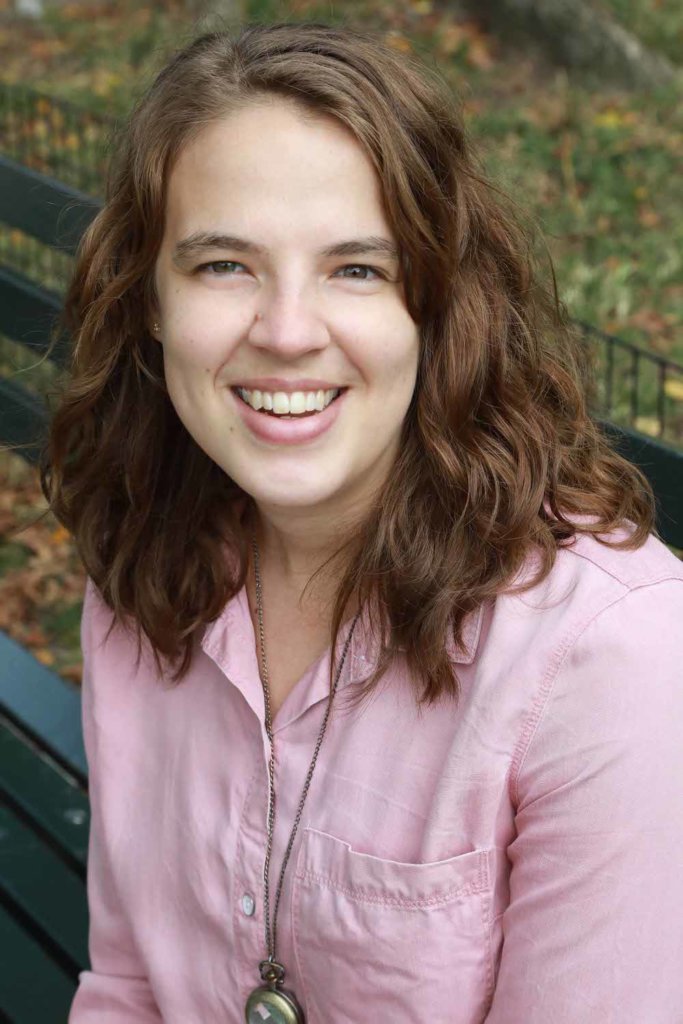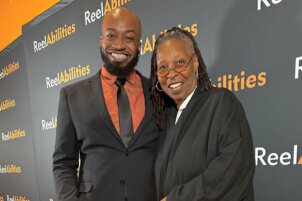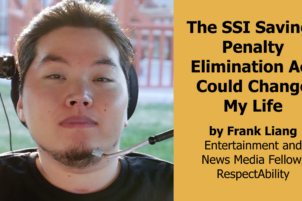New York City, March 25 – A couple of weeks ago I received a larger-sized envelope on my doorstep. Initially I thought it was something for my partner. I’m blind, and I use a lot of different techniques or apps to adjust to a predominately sighted world. For this task, I scanned the mailing label with an app on my phone that converts text to speech to uncover who the sender was. In the end, it was indeed addressed to me, and it was my master’s in social work degree diploma.
For a moment, I caught myself reflecting on the care-free, and seemingly invincible version of myself from 12 years ago. I had been focused on getting a college degree, moving to a big city, and recording and producing stellar music. In contrast, the somewhat wiser, still witty as ever, and more cautious 30-year-old iteration of me is not meeting the expectations of my youth. It’s taken some time to embrace and love all the facets of what has made and continues to make me Abigail.
The me back in the early days of undergrad had envisioned the “grown up” me being Miss Independent. She’d have this super satisfying job that paid well and was, most likely, in the music industry. All of the stereotypes she tried to run away from about disabled people and traditional roles for women would magically dissolve if she lived in a big progressive city. From the outside looking in, you could have said I was well on my way toward accomplishing [most] of these things.
Then, the summer prior to my last year of undergrad I’d received a very unexpected cancer diagnosis. Initially I did my best to be brave and show everyone around me that this wouldn’t be something to bring me down. Pretending to be strong is exhausting, though. I had quite a lot of lemons tossed my way, but I really had no energy to make them into some semblance of lemonade. I just wanted to be healthy and have a chance at being “normal.” With lots of support from my community and family, I was able to finish out the fall semester, which consisted of just course work, and then the plan was to move home and recover with hopes of being well enough to find an internship (a requirement for graduation) the following summer.
Once I finished my chemo and radiation treatments, I invested the little energy I still had into applying for internships in NYC. A lot of them were at rather lofty and ultra-competitive companies. I applaud the younger me for really aiming for the stars, but I wasn’t always so kind with myself when no responses came, which was often; or an actual response with a rejection, which was more common. At one point, a contact I had made through a friend of a friend reached out and offered to share my resume with a recording studio manager looking for summer interns. The manager e-mailed me soon after and shared their interest in my skills. We had a conversation over the phone, and an offer materialized the next day. I felt encouraged that someone finally saw potential in me but was also concerned about how to navigate disclosing my disability.
Disclosure is a murky area for folks within the disability community. You could ask a group of ten disabled adults about how or when someone should disclose, and you’ll get ten unique responses. At the time, I felt that I owed it to the studio manager. I didn’t want to show up on the first day with my guide dog and throw them in a tailspin. It was also a tricky spot, because my plan was to take the internship and promptly move 2,000 miles away from the state I had always considered home. What if I got there and they decided they didn’t want me as an intern?
In the end, I did decide to share that I am blind and some of the ways that my disability makes me a valuable employee and team member. Unfortunately, when I called to share all of this, I reached voicemail and didn’t have a chance to share this in a conversation. Suddenly, the next day I received an e-mail from the manager’s assistant with some vague message about how they ended up hearing back from another applicant and the internship wasn’t available to me anymore.
Would I now have handled this way of disclosing differently? Probably. That summer had more in store for me, though, because I ended up supporting a small production company in Manhattan that created content for public radio programs and podcasts. They were much more open to me and my skills—disability and all. It was a great first step toward moving into a profession, but there were no full-time positions for me once the internship ended. I began considering what I was qualified to do outside of music and audio.
For the first year or so living in NYC, I kept finding myself in part time roles to serve youth and adults with disabilities. At the time I discounted them as merely being a means to paying my bills. Someone was looking for a tutor to learn braille; a small non-profit needed someone to set up microphones and music equipment for a rehearsal space; a summer program needed an instructor for high school students with disabilities bound for college. Now, I see them as invaluable chances to witness how far we have to go in making all spaces of society inclusive, and that working alongside my disabled colleagues is actually incredibly rewarding.
For five years I coordinated a program that, more or less, fell into my lap. It was a mentoring program to support college students with low vision. My small team of colleagues and the participants of our program helped me to unearth this passion for creating equity. Most of the students, though, were navigating additional barriers beyond being blind or having low vision. Witnessing some of their struggles to access housing, healthcare, and an ageist and ablest workforce were just some of the compelling reasons for me to return to school, and why I thought social work might be a good fit for me. I wanted to acquire the knowledge and experience to better understand systems of power and how to help others advocate for what they need. Music was still something important to me, but my focus had shifted. I had a desire to find employment in an area that had a different impact on people’s lives, and my creative outlet wouldn’t have to carry the weight of paying for my basic necessities.
I am not a famous record producer, but I have made the largest city in America my home for the last eight years. I have not debunked stereotypes about disabled women, but I sure do my hardest to speak truth to power and to educate others with compassion and love. At the end of the day, I am most proud of how I am growing. Being independent does not mean I accomplish everything on my own, but that I am accomplished because of the support from those who surround me. Independence, I think, is more about having the autonomy to choose when and how I do something, and having other people to lean on certainly makes things more fun and less lonely.
Abigail Shaw is a Civic Engagement Apprentice with RespectAbility. While the month of March is traditionally recognized as Women’s History Month, RespectAbility is using this moment to amplify the voices of all underrepresented genders in the Disability community, with a month-long editorial series titled, “Empowering the Next Generation,” acknowledging the important role each of these voices plays in the overall goal of building gender equity and equality for future generations








